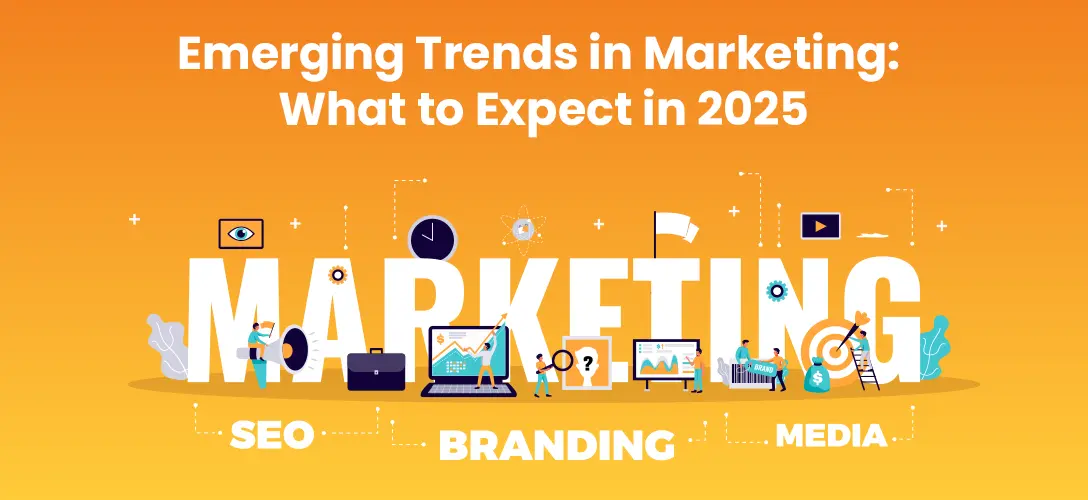Introduction
The world of marketing is undergoing rapid transformation, and businesses must stay agile to keep up with the ever-changing landscape. As we head into 2025, technology will continue to reshape marketing strategies, and the consumer experience will be more personalized than ever before. In this blog post, we’ll explore the emerging trends in marketing, future trends in digital marketing, and the key role of voice search optimization in shaping marketing strategies for 2025.
AI-Powered Marketing: The Future of Personalization
Artificial intelligence (AI) is already making waves in the marketing world, but by 2025, it will play an even more dominant role. Emerging trends in marketing show that AI will be central to personalizing customer interactions, automating tasks, and optimizing campaigns at scale. AI-driven platforms will help businesses predict consumer behavior, segment audiences more accurately, and deliver hyper-targeted content.
For instance, AI tools can analyze vast amounts of data to understand individual customer preferences, allowing marketers to create content and offers that speak directly to the consumer’s needs. This will create a more personalized experience, increasing customer loyalty and driving higher conversion rates. Brands that effectively use AI to automate processes and personalize customer journeys will gain a competitive edge in the market.
Voice Search Optimization: A Growing Necessity
The use of voice-activated devices like Amazon Alexa, Google Assistant, and Siri is increasing, making voice search optimization an essential aspect of SEO strategies. By 2025, voice search is expected to account for a significant portion of all online searches. This shift means marketers must adjust their SEO strategies to optimize for the conversational nature of voice queries.
Unlike text-based searches, voice searches are often longer, more natural, and conversational. Instead of typing “best running shoes,” users might ask, “What are the best running shoes for flat feet?” As a result, businesses must focus on long-tail keywords and natural language to ensure their content ranks well in voice search results. Additionally, since many voice searches are location-based, businesses must invest in local SEO to ensure they appear in local voice search results.
Video Marketing: The Future of Content Consumption
Video continues to be one of the most powerful tools in a marketer’s arsenal. By 2025, video marketing will not only remain a crucial component of digital strategies but will also see an increase in interactive formats. Consumers prefer video content over text-based information, and platforms like YouTube, Instagram, and TikTok are already driving significant engagement for brands.
In 2025, live streaming will become even more important, allowing businesses to connect with their audiences in real time. Whether through product launches, behind-the-scenes content, or Q&A sessions, live video builds trust and strengthens the connection between brands and consumers. Interactive videos will also gain popularity, offering consumers a chance to engage with content directly—whether through quizzes, clickable options, or product demos.
Social Commerce: Shopping Directly on Social Media
Social media platforms have already evolved into major e-commerce hubs, and by 2025, social commerce will be a staple of digital marketing strategies. With platforms like Instagram, Facebook, and TikTok integrating shopping features directly into their apps, consumers will be able to discover and purchase products without ever leaving the platform.
This shift will encourage brands to build more seamless and engaging shopping experiences within social media environments. Marketers will need to create compelling product pages, optimize for mobile shopping, and leverage influencers to drive social commerce sales. Social commerce also presents an opportunity to tap into younger, mobile-first consumers who prefer shopping directly within their social feeds.
Influencer Marketing Evolution
Influencer marketing has grown significantly over the past few years, but by 2025, micro and nano influencers will become even more valuable to brands. While traditional influencer partnerships often focused on celebrities or influencers with millions of followers, smaller influencers tend to have more engaged audiences that trust their recommendations.
In the future, brands will focus on building long-term relationships with influencers who share their values and can create authentic, consistent content. Influencers who have genuine connections with their followers will continue to provide brands with a cost-effective way to promote their products and services.
Ethical Marketing and Data Privacy
As consumers become more concerned about their online privacy, ethical marketing and data security will take center stage. With the implementation of stricter regulations like GDPR and CCPA, businesses must be transparent about how they collect, store, and use consumer data.
In 2025, brands will need to ensure their marketing practices align with the growing demand for transparency and ethical behavior. Customers will increasingly support businesses that prioritize sustainability, data privacy, and social responsibility. By incorporating these values into their marketing strategies, brands can foster stronger relationships with customers and build loyalty in a highly competitive marketplace.
The Role of Automation and Programmatic Advertising
Programmatic advertising, which uses AI to automate the buying and placement of ads, will continue to grow in popularity. In 2025, marketers will rely more heavily on AI and automation to optimize their ad campaigns in real time, ensuring they reach the right audience with minimal human intervention. This will allow businesses to improve the efficiency of their marketing spend and reduce the risk of wasted budget.
Programmatic advertising will also help marketers target audiences with greater precision, providing more relevant and timely ads based on consumer behavior and preferences. This shift to automation will allow businesses to better track the effectiveness of their campaigns, ensuring they achieve maximum ROI.
The Importance of Local SEO
As voice search continues to rise, local SEO will become an even more important part of digital marketing strategies. Consumers increasingly use voice assistants to find local businesses, products, and services, making it crucial for brands to optimize their content for local search terms.
To take full advantage of local SEO, businesses should ensure their Google My Business profile is up to date, claim their listings on local directories, and focus on location-based keywords. This will help businesses increase their visibility in local voice search results and attract nearby customers.

